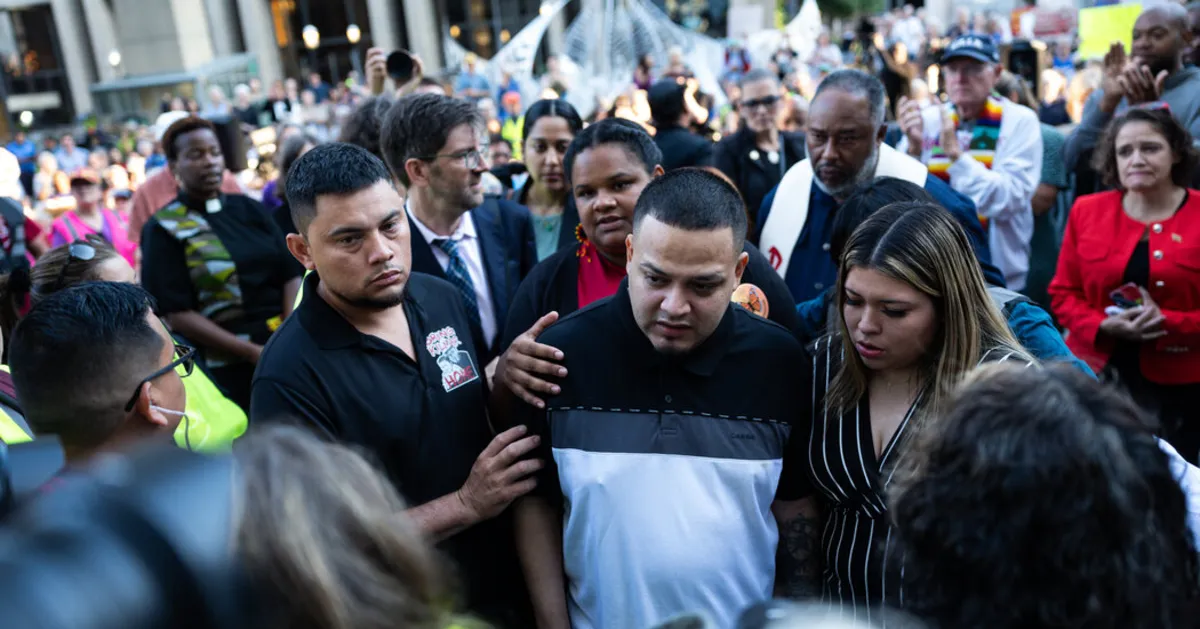
Outside the office, attorney Simon Sandoval-Moshenberg, representing Mr. Abrego Garcia, expressed concerns regarding the actions of U.S. Immigration and Customs Enforcement (ICE). He stated that the purported purpose of the meeting with ICE was to conduct an interview, which he labeled as “clearly false.” Sandoval-Moshenberg highlighted that immigration authorities did not disclose the reasons for Mr. Abrego Garcia’s detention or his subsequent destination.
A crowd of supporters responded with chants of “boos” and “shame” upon hearing the news of Mr. Abrego Garcia's detention. Immigrant rights volunteers wearing yellow vests protected his family members as they exited the building. Following this incident, Mr. Abrego Garcia’s legal team filed a habeas petition in Maryland's Federal District Court, aiming to halt his deportation to Uganda.
The habeas petition contends that the previous administration, under Donald Trump, re-arrested Mr. Abrego Garcia without allowing him to voice his “fears of persecution and torture” upon returning to Uganda. Moreover, he is entitled to a two-business-day grace period post-deportation, as mandated by a standing order from Maryland's chief federal judge, which temporarily halts government expulsions of immigrants for 48 hours after a habeas petition is filed.
Over the weekend, Mr. Abrego Garcia’s lawyers accused the Trump administration of attempting to “coerce” a guilty plea from him regarding human smuggling charges filed against him in an indictment earlier this year. According to the legal team, officials promised to send Mr. Abrego Garcia to Costa Rica—where he could live freely—as a legal resident if he agreed to plead guilty and serve a prison sentence. Conversely, they stated that failure to comply would result in his deportation “halfway across the world” to Uganda, where his “safety and liberty would be under threat.”
Attorney Sean Hecker, addressing the media after the detention, remarked, “The government now seeks to deport Mr. Abrego to Uganda as punishment, despite Costa Rica’s willingness to accept him as a refugee.” He emphasized that the ongoing campaign of retribution persists because Mr. Abrego Garcia refuses to plead guilty to a case that should never have been initiated.
This arrest in Baltimore marks another chapter in a prolonged saga involving Mr. Abrego Garcia. The situation began earlier this spring when the Trump administration unlawfully deported him to a notorious terrorism prison in El Salvador, despite a court order prohibiting such action. Following weeks of insisting they could not return him to U.S. soil, Trump officials did indeed bring him back—not to rectify their mistake but to pursue criminal charges against him.
During his immigration check-in, Mr. Abrego Garcia was met with cheers from dozens of supporters, including his wife, Jennifer Vasquez Sura, and his brother, Cesar. He delivered an emotional plea to the immigrant community, urging them to continue fighting for their rights. “Brothers and sisters, my name is Kilmar Abrego Garcia, and I want you to remember that today, I can say with pride that I am free and have been reunited with my family,” he stated.
While initially appearing nervous, Mr. Abrego Garcia found strength in sharing memories of his family, particularly playing with his children on a trampoline, which helped him endure his time at the Terrorism Confinement Center (CECOT). He concluded his remarks with a message of hope, reminding the audience that his struggle represents many immigrant families facing similar threats of separation under the Trump administration's policies.
As he entered the federal building, the atmosphere became chaotic. Mr. Abrego Garcia bowed his head, walking slowly amidst chants of “ICE go home” and “Si se puede,” which translates to “yes you can.” The public's outcry reflects a broader commitment to advocating for immigrant rights and opposing the actions of ICE.
This incident underscores the ongoing challenges faced by immigrant families under stringent immigration policies. As the legal battle continues, the support from the community remains crucial in standing against injustices and advocating for the rights of those targeted by the government.